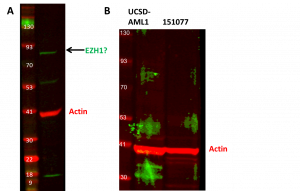Hello again! Here is my first attempt to find an EZH1 antibody. I have mainly focused on EZH2 in the PRC2 complex as the methyltransferase responsible for the H3K27me3 mark. However, EZH1 can functionally substitute for EZH2 in PRC2. We have a good antibody to detect EZH2 levels in patient AML samples. However, for some samples that we see detectable levels of H3K27me3 mark but no EZH2 expression, we suspect that EZH1 might be substituting for EZH2. We would like to get a good EZH1 antibody to determine expression levels of this protein in patient samples. I tested three antibodies for EZH1 using western blot, and despite some initial results of detecting a potential band for EZH1 in brain tissue with an Active Motif antibody (Figure 1A), we were unable to see it in patient cells (Figure 1B). Full experimental detail can be found on Zenodo. Also listed in my experimental details is our plan moving forward to obtain an EZH1 antibody!

Figure 1: Western blots using Active Motif EZH1 antibody (green) and actin (red) loading control in (A) brain lysate, (B) AML cell line (UCSD-AML1) and patient sample (151077)we expect would express EZH1. We detect a faint band of the expected size (~85kDa) in (A) but do not detect any band in (B).

Hi G
I think you’re embarking on an experiment (finding a useful antibody) that requires some thought. If your antigen is EZH1, then I would as a matter of course, create (or get) an EZH1 knock-out cell lines and the parental control. This is honestly the only un (less)biased way to know if you have an antibody that detects your antigen. If it were me, I’d test the lysates (+/- EZH1) on a Western, by IF and definitely by immunoprecipitation followed by MS (Marcon et al, Nature Methods) – and titre the antibodies. And only bother to check if the antibodies are monoclonal (not worth the effort doing it for polyclinals). After this set of experiments you will confidently be able to say that you have an EZH1 antibody worth using in an experiment – and the world will thank you for it (though the companies that sell non-specific antibodies may not :>)
al
Thanks for the comment Al! I’ve been able to locate reagents for knockdown of EZH1 to address the specificity of any band I might eventually get (but I am still searching for an antibody that gives me any sort of band of approximately the right size in a cells amenable to knockdown). I’ll will investigate knockout options.